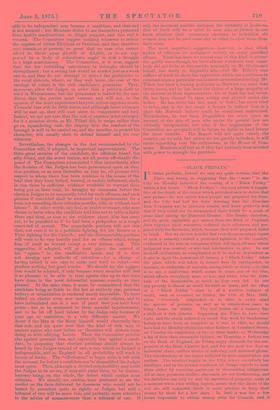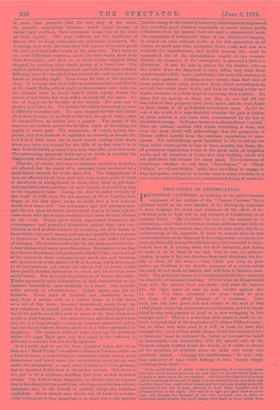"BLACK FRIDAYS."
IT seems probable, indeed we may say quite certain, that the 7'imes was wrong in supposing that the " scare " in the City on Monday indicated the coming of a "Black Friday" within a few hours. "Black Fridays"—the very phrase is sugges- tive of the depth of the terror which provoked men to devise that new phrase—do not arrive when people are prepared for them, and the City had had ten days' warning that the Aberdare Iron Company was in grievous straits, and knew perfectly well that if they could not be surmounted there would be a crash of some kind among the Discount Houses. The Banks, therefore, and the great capitalists got money from the Bank of England, drew together their resources, reduced their advances, and pre- pared fully for the storm, which, because they were prepared, failed to break. But we do not wonder that even the momentary report of such a calamity excited a profound agitation in the country, evidenced in the rain of telegrams which fell upon all men whose judgment was trusted, or who bad information to give. In our modern civilisation, so complicated as it is, and so dependent as it also is upon the command of money, a "Black Friday" takes the place which was taken in former days by earthquakes, or famines, or outbreaks of murrain among cattle or sheep,—is, that is to say, a misfortune which seems to come out of the blue, which affects everybody more or less, and which tries the forti- tude of the imagination as much as they ever did. In our day poverty is almost as much dreaded as death, and the effect of a "Black Friday "—that is, of a sudden collapse of credit, such as occurred on Friday, the 11th of May, 1866, when " Overends " suspended—is to raise in every mind the spectre of poverty, as well as in numberless cases to bring home its reality. The evil _bursts on a country like a shell on a rich quarter. Supposing the Times to have been right, and the shock inflicted on credit this week by Sandersons' failure to have been as complete as it was in 1866, we should have had on Monday afternoon other failures in Lombard Street, on Tuesday the suspension of two or three banks, on Wednesday a list of first-class mercantile failures, on Thursday a furious run on the Bank of England, on Friday angry demands for the sus- pension of the Bank Charter Act, and for the next ten days an industrial chaos, endless stories of suffering, and universal gloom. The ramifications of the injury inflicted by such catastrophes are endless. The mischief begins in the City, where everybody has liabilities, and in the normal condition of things expects to meet them either by receiving payments or discounting obligations. All at once payments decline, discounts are not forthcoming, and the liabilities can only be met by sacrifices of property, made at a moment when even willing buyers, aware that the limits of the evil are still unknown, think it more prudent to keep their money by them for a few days. In 1866 it was for a few hours impossible to obtain money even for Consols, and it
more than probable that the very fury of the storm, by actually suspending business, saved many houses, or rather their creditors, from enormous losses out of the relics of their capital. The next sufferers are the employers of labour, who in many businesses are systematic borrowers, dis-
c nutting, as it were, the sums they will receive when their goods are sold, and they suffer nearly in the same way. They must go on, must fulfil their contracts, must pay their wages, must keep their fires alight ; and they do it, their regular supplies being stopped, by securing other funds, always at a heavy loss. The sudden inability or unwillingness of one bank to discount ordinary bills may leave five hundred firms without the cash to pay 50,000 hands on Saturday night. Then comes the turn of the operative class. It is rarely that they suffer as instantaneously and directly as the South Wales colliers might in this instance have done, for the calamity must be heavy indeed which wholly arrests the labour of any trade, but they suffer seriously all the same. No rise of wages can be thought of for months. No man out of employ gets taken on. No careless liver finds borrowing to meet a difficulty tolerably easy. No man escapes the fear that before all is done he may, by no fault of his own, be out of work,—that is, changed from an artisan into a pauper. The mains of the reservoir are choked, and to the furthest reach of the piping the supply of water ends. The suspension, of course, is only tem- porary, but then business is regulated as severely as human life, and it is of little more use to have money coming next week, when you have not enough for the bills of to-day, than it is to have food faithfully promised you nine days after your last meal. The intervening symptom, bankruptcy or death, is precisely the disagreeable which you are desirous to avoid.
Thus far, of course, only men in business, operatives included, are affected, but the result of a monetary crisis produced by a great failure extends far wider than this. The imaginations of men are affected by all they read and hear, a new spirit of thrift is developed or strengthened in them, every kind of purchase, and especially every purchase of mere luxury, is avoided as long as the impression lasts. Among the first to suffer severely by the crash of 1866 were the job-masters of West London, who began in the first three weeks to think that a new murrain would be a lesser evil. One job-master had 250 carriages-and- pair thrown upon his hands, and noticed that in at least half the cases those who threw them could not have been directly affected by the crash. People grew timid, reproached themselves for extravagance, and protected themselves against their own con- sciences as well as their bankers by sacrificing the first luxury at hand which cost much money and was not specially advantageous to themselves. It is the women, not the men, who suffer for want of carriages. The jewellers suffer like the job-masters, and the bric- k-brae dealers very much more than either. We venture to say that had Messrs. Sanderson's fall produced a Black Friday, one clear half of the owners of those curiosity-shops which are now breaking out by dozens in every district of West London, which never seem to do any business., yet which are always full of goods, would have quietly betaken themselves to other and let us hope more useful trades. Nor is it only the ministers of luxury who suffer. Trades apparently quite independent of such fluctuations, as, for instance, booksellers, come suddenly to a stand. The journals suffer severely in advertisements. Estate agents can get no business. Every kind of property not absolutely neces- sary, from a marine villa or a quaint house to a silk dress or a roll of fine linen, becomes depreciated, partly from the new reluctance to spend, partly from the unacknowledged feel- ing in the public mind that now or never is the time when they ought to have bargains. All values decline, and short as the time may be, it is long enough to cause an immense amount of suffer- ing, not the less severe because much of it is either unfounded or imaginary. The suspense suffered some years ago by hundreds before the Agra Bank gave way was equal in the suffering it inflicted to a severe but not deadly epidemic.
It is a habit, and we see we have ourselves fallen into it, to look at a "Black Friday "—a sudden collapse of London credit—as a kind of storm, a meteorological commotion which causes great disturbance and much noise, but nevertheless clears the air, and makes the atmosphere at once more healthy and more pleasant, but we question if this view is altogether correct. The storm is too apt to be a typhoon, levelling fine trees as well as rotten trunks. The hollow firms disappear, no doubt, and we suppose that is beneficial, but the weak firms, which are nevertheless solvent, disappear also, to the benefit of nobody except the leviathan capitalists. Every honest man driven out of trade to a melan- choly retirement or into pauperism is so much loss to the general
fund of energy in the country, and every timid capitalist frightened into avoiding good business represents so much money partly withdrawn from the general fund devoted to reproductive work. The suspension of labours like those of the Aberdare Company, if carried on even without profit, is, for this generation at all events, so much pure loss, represents fewer coals and less iron available for manufactures, and 50,000 persons who must be maintained out of the accumulated wealth of the country. Besides, the clearance of the atmosphere is assumed a little too absolutely. It may be, nay is, clearer for the dealers, who, as the hollow firms are supposed to have fallen, may trust those which remain a little more confidently, but even this clearance is often only apparent. Nothing is more certain than that each of these panics ruins many powerful firms, which nevertheless do not fall, but retain their credit, and keep on making bolder and bolder ventures, in a futile hope of retrieving their position. No firms fall so heavily as these, for they do not fall till the last relics of their property have been spent, and the trust funds in their hands in all probability encroached upon. As for the rest of the world, it is very doubtful whether the gain it obtains in extra caution is not more than overbalanced by its loss in diminished energy. Infrance business is almost always "sound," from the extreme caution with which everything is done, but even the most timid will acknowledge that the prosperity of France suffers heavily from the constant expectation of cata- clysms. The undertakings most beneficial to the world are not those which return profit or loss in three months, but those, like all permanent engineering works on the great scale, all irrigation works, and all branches of house and ship-building, which will not yield their full returns for many years. The recurrence of cataclysms, whether we call them "Revolutions," or "Black Fridays," or "Great Strikes," make men unwilling to engage in long enterprises, and are by so much—and in many countries it is very much—direct injuries to the material well-being of mankind.



































 Previous page
Previous page